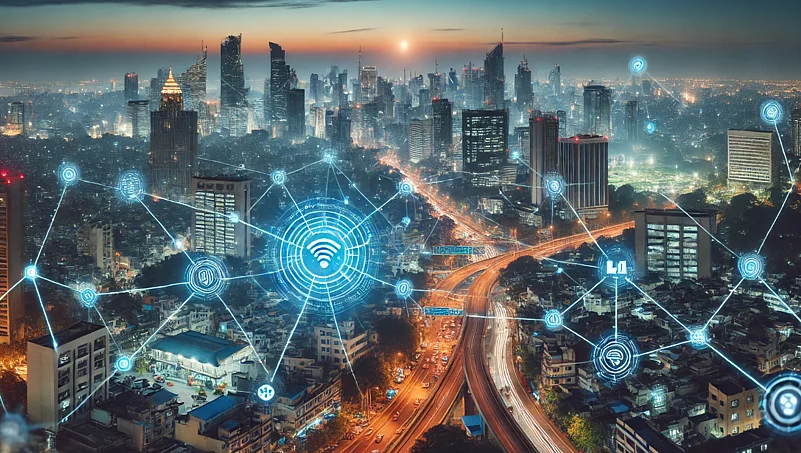Digital Transformation in Indian Cities
Envisage a city that has no property disputes, traffic is seamless, and government services are transparent. This is possible in a country like India, which is rapidly urbanizing, and this transformation is possible through blockchain technology. Although the association of this term is usually with cryptocurrency, blockchain is beyond monetary circles; it can be used for most others—from governance to presenting rural infrastructure, public services, and more. Adopting a blockchain approach in planning a city and administering it would constitute another step in making India's urban centers highly efficient and citizen-friendly.
The Power of Blockchain in Urban Governance
Bringing in decentralized, tamper-proof ledger technology makes blockchain an excellent option for streamlining governance. One of the major urban issues in India is the bureaucratic delays that lead to inefficiency, corruption, and mismanagement. A blockchain-backed system can provide a transparent and immutable record of transactions, eliminating middlemen and keeping all parties accountable. Government contracts and procurement processes, for instance, can find their secure documentation on the blockchain, reducing fraud while enhancing trust between the government and citizens.
Resolving the Land Records and Property Management
Land conflicts in India have been an endless dispute for decades. Confusion surrounding ownership records has triggered reams of legal battles that could easily have been avoided. A blockchain-registered land title would provide an effective solution because it offers an immutable digital ledger view of property ownership. Each transaction, be it a sale or inheritance, will be recorded securely and therefore immune to fraudulent claims or illegal occupations. Estonia and Sweden have experimented with this approach; India, too, can follow in their footsteps for a transparent, corruption-free, and efficient land management system.
Smart Contracts for Public Infrastructure
Smart contracts may be particularly suitable for public infrastructure contracts. Often, infrastructure projects in India get balled up in red tape and mismanagement, and therefore, they are not completed on time or within the budget. Smart contracts are defined as contracts that are programmed to self-execute terms that have been written into code. The result is that payments and approvals are made as soon as predefined conditions have been satisfied. The elimination of intermediaries makes for easier contract enforcement and timely completion of such projects as roads, bridges, and metro systems. At each step of the way, it establishes audit trails and accountability.
Renew Waste Management Systems
Urban waste management is one of the major challenges faced in Indian cities; with collection, disposal, and recycling, resources are not used effectively. Blockchain technology can enable a decentralized tracking mechanism for waste, which can be employed for real-time monitoring of all steps, from waste collection to recycling, thus allowing citizens to engage in incentivized recycling programs where smart contracts reward households for proper disposal. This promotes efficiency in waste management within municipalities and also promotes sustainability.
Traffic Management and Public Transport Optimization
Some might struggle but corrupt an environment to find solutions through traffic management and public transport optimization. Nowhere has traffic congestion increased in metropolitan areas. Transport and commuter management are highly possible with the use of blockchain to provide an integrated, tamper-proof, decentralized traffic control system where real-time data is drawn from GPS systems, traffic cameras, public transport networks, etc., for dynamic route optimization to minimize congestion while improving the commuting experience. In time to come, future citizens may have public transport ticketing systems on the basis of blockchain, and fare collection would be seamless with no fraud.
Public Records and the Protection of Citizen Identity
There is a need for securing a digital identity system for public services. Such undertakings require full-blown investments in the entire stages of using blockchain technology for identity management in which every citizen will have a unique and tamper-proof digital ID responsible for easy access to services like health care, education, and other welfare programs. This system places the use of digital IDs for voter registration and the prevention of electoral fraud, creating a democratic process that is robust and transparent.
Enhancing Energy Management through Blockchain
Energy consumption in urban areas is rising, making a strong case for a well-functioning power distribution grid. Blockchain enables decentralized energy trading, where a household producing solar energy can sell its surplus to other households without any intermediaries. In this way, peer-to-peer energy trading significantly reduces dependence on centralized grids and will lead India towards realizing its goals of renewable energy and efficient power distribution into future sustainable development goals.
Obstacles and Prospects
Blockchain technology in urban development has several barriers to entry. Like public-private digital infrastructure, ensuring its accessibility and sustainability requires upfront investment in regulatory frameworks to secure the technology for deployment. Furthermore, raising public consciousness and facilitating uptake will be integral components of the entire adoption strategy.
But the increasing possibility of smart cities with digital transformation in India opens up a new dimension for blockchain to be used. The initiatives of the government, like India's Digital and Smart Southern States, can make room for blockchain in the creation of transparent and efficient, technologically advanced urban centers. As India seems to be all set for a digital revolution, the infusion of blockchain into urban development might very well revolutionize the cities. Strategic investment and policy support would soon lead to smart cities powered by blockchain, making India a pioneer in the digital innovation of urbanism.














